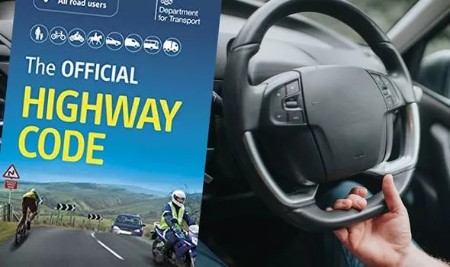44% of road users haven’t looked at the Highway Code for more than 20 years
– Insurer reveals road users DON’T know the latest rules of the road-
- More than 40% of road users haven’t looked at the Highway Code for over 20 years
- One in five cyclists believe they can ride on pavements
- Admiral data reveals 22% of road accidents involving cyclists over the last decade have taken place in the last two years
- 75% of road users believe cyclists SHOULD have third-party insurance
A new investigation by Admiral MultiCover has revealed that a shocking 44% of road users haven’t looked at the Highway Code for more than 20 years, meaning many people could be driving a car or riding a bike without truly understanding the latest rules of the road, and putting themselves and others in danger.
With more people turning to active travel following COVID-19, more bikes are likely to be on the roads than ever before, and Admiral is urging both cyclists and motorists to make sure they understand the Highway Code, in order to keep roads safe and reduce the number of accidents involving bikes.
Based on analysis of Admiral’s own data since 2011, 22% of road accidents involving cyclists have happened in the last two years alone, with 2019 being the year with the highest number of claims to date. Accidents involving cyclists in 2020 account for 5% of all claims involving bikes over the last ten years, and as cycling becomes more popular, Admiral is warning this figure could rise.

Understanding the Highway Code
Admiral’s research found that only one in ten road users have read the Highway Code within the last three years, meaning a high number of motorists and cyclists may not be up to date with the latest regulations.
In the last five years alone, the Highway Code has been updated 15 times in total[i] but the data from Admiral’s study shows that road users aren’t keeping up with the changes and therefore, could not only be breaking the rules, facing fines and penalty points, but they could also be putting themselves and other road users in danger.
Rules for cyclists
When it comes to understanding the rules of the Highway Code, one in five cyclists believe they are allowed to ride on public pathways, despite this being a criminal offence that could see them hit with a fine of £50 if caught.
In addition, 16% of cyclists didn’t know that they must have lights and reflectors fitted on their bike if riding at night. Again, not complying with this rule of the Highway Code could result in a fixed penalty notice of £50[ii].
Meanwhile, over a fifth (22%) of all road users (which includes motorists and cyclists) incorrectly believe cyclists are able to ride more than two abreast on narrow and busy roads. However, this is not the case because of the risks and dangers it could cause for both motorists and cyclists. According to the Highway Code, cyclists should never ride in this way, in fact, they should cycle in single file when travelling on narrow and busy roads as well as when riding round bends.[iii]
Rules for motorists
Admiral’s investigation found all road users seemed to have a better understanding of the Highway Code rules for motorists, as 98% correctly said drivers should always check blind spots and mirrors for cyclists when turning or changing lane.
According to the study, 91% of road users correctly believe motorists should give cyclists the same amount of room as they would when overtaking a car which aligns with the rules laid out in the Highway Code.
However, more than one in ten (14%) road users didn’t know that drivers could be fined for stopping in a cycle box at traffic lights.
Prioritising pedestrians and cyclists
Admiral recently called for more permanent plans to be put in place in UK cities to create safer and more sustainable travel for all road users and pedestrians. This is because COVID-19 not only inadvertently changed the layout of towns and cities, but it also changed the way people chose to travel.
As part of the investigation, Admiral submitted an FOI request to local authorities across the UK to find out how much money has been invested in cycling infrastructures to make roads safer for all road users.
Admiral found that local authorities across England have invested £3.4million, on average, in cycling infrastructures since 2018[iv]. In total, 18% of this investment has been spent this year, meaning further improvements are being made to cycle lanes and other bike facilities in towns and cities following COVID-19.
In Wales, where local authorities apply for Active Travel funding from the Welsh Government, over £890,000 on average has been granted since 2018. However, COVID-19 has caused delays in the funding awards which means new investments and improvements to the cycling infrastructure won’t be made until later in the year.[v]

With the continued push for active travel across the UK, the Highway Code is proposing new changes to introduce a hierarchy of all road users, clarify the rules and regulations for both pedestrian and cyclist priority as well as determine safer overtaking guidance. This proposal is currently under consultation which is due to close at the end of October 2020.[vi]
Despite the proposed changes, Admiral’s study found that almost two-thirds (63%) of all road users believe that everyone should be ranked equally when it comes to mode of transport on the roads, despite the fact that cyclists and pedestrians are at a greater risk of being seriously injured following a road accident.
Only 30% of motorists agree that more vulnerable road users should be prioritised in comparison to 60% of cyclists who believe pedestrians, cyclists and horse riders should always be given the right of way over cars, motorbikes and other vehicles.
In addition, 60% of all road users don’t believe priority should be given to cyclists at junctions, and over a quarter (26%) even admitted they thought the driver had the right of way if they had stopped at the junction first, which would be incorrect according to the proposed changes to the Highway Code.
The results from Admiral’s investigation shows that the proposed plans to update the Highway Code to clarify existing rules on pedestrian and cyclist priority would be welcome to help clear up the confusion among UK road users and to keep everyone safe on the roads. Admiral is urging all road-users to keep on top of any updates to the Highway Code, which can be done either by signing up to email alerts online or following the Highway Code on Twitter or Facebook.
Insurance for cyclists
Although cyclists don’t currently need insurance to cycle on UK roads, 75% of all road users believe it should be a requirement for riders.
The investigation shows that there is a difference in opinion between road users when it comes to third party insurance for bikes and their riders. Almost eight out of ten (79%) motorists think it should be essential for cyclists to be insured to use the roads, in comparison to less than half (47%) of cyclists.
Over the last ten years, Admiral’s data reveals a quarter of the road accidents involving cyclists affected riders in their thirties, followed by those in their forties. According to Admiral data cycling is also a popular choice for people in their twenties, as 22% are most likely to jump on their bike as a form of travel or exercise.
Admiral’s data also shows 88% of accident claims including cyclists and motorists, involved a driver with a full driving licence. This is in comparison to just 2% of accidents involving drivers with a provisional licence.
The number of cycling accidents per month
| Month | % of cycling accidents taking place each month |
| July | 11 |
| June | 10 |
| October | 9 |
| August | 9 |
| September | 9 |
| May | 9 |
| November | 8 |
| January | 8 |
| April | 7 |
| March | 7 |
| February | 7 |
| December | 6 |
According to Admiral’s claims data, July and June account for the highest percentage of cycling accidents however, August, September and October all account for the third highest percentage of cycling accidents taking place.
As more people have taken to cycling in recent months, Admiral is warning cyclists to be careful riding in the autumn and winter months as the change in weather and visibility will impact road conditions for all road users. Fallen leaves can make road surfaces slippery and heavy rainfall will not only reduce visibility but will also increase stopping distances.
Ellie Willis, head of Admiral MultiCover said: “With an increase in the number of cyclists taking to the UK roads recently, and upcoming changes expected to the Highway Code, it’s important that people understand the rules to improve the safety for all road users.
“Our data has shown that the number of incidents involving cyclists has increased this year, in comparison to previous years, but we can all play a part in helping to keep all road users safe, and keeping up to date with the Highway Code is a good place to start.
“As the seasons change, we know that autumn and winter can be particularly dangerous times of year for road users due to changing weather, reduced visibility and poor road conditions. If you’re new to cycling, this could be the first-time riding in such conditions, so it’s important to be seen. Wearing appropriate clothing and having suitable accessories, like lights and reflectors, for your bikes will mean you’re easier to spot by other road users.
“We also recognise and understand that the way people travel is changing and therefore believe more permanent infrastructure plans, for safe and sustainable travel, for all road users should be put in place. It’s promising to see how much is being invested in cycling infrastructures across the UK, as dedicated spaces on the roads will help to keep everyone safe.”
Find out how well you know the rules of the road here.

| [donate]
| Help keep news FREE for our readersSupporting your local community newspaper/online news outlet is crucial now more than ever. If you believe in independent journalism,then consider making a valuable contribution by making a one-time or monthly donation. We operate in rural areas where providing unbiased news can be challenging. |























